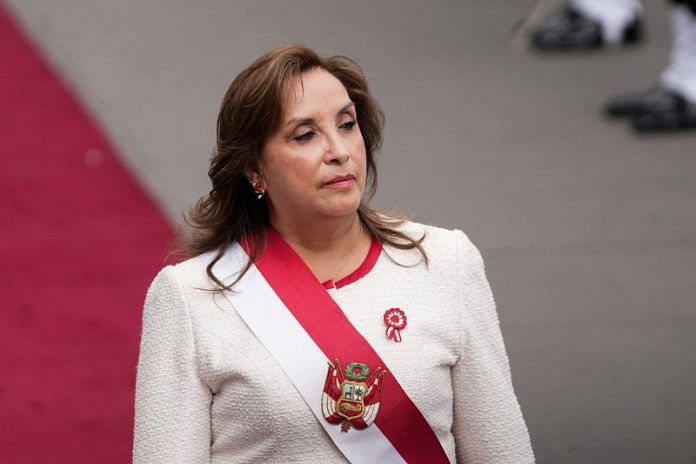By Marco Aquino
LIMA (Reuters) -Peru is considering whether to give the green light to a wave of new mining projects worth a combined $6 billion in investments, President Dina Boluarte said on Monday, as her deeply unpopular government seeks to boost revenues from the industry.
The government is evaluating the authorization of 134 exploration and exploitation projects, Boluarte said in a traditional Independence Day address to Congress.
Officials in Peru, the world’s third-biggest copper producer, are in talks with informal miners who launched protests in late June, blocking a transport corridor used by major miners including MMG and Glencore.
Miners have paused that protest and corridor blockade during negotiations over a potential new law for the sector.
Among informal miners, tensions escalated after over 50,000 were removed from a formalization scheme, leaving just 31,000 that the government is seeking to bring in line with regulations by year end.
Boluarte said the government was working on starting a private mining fund to give small formal miners access to better financing. As she spoke, police used tear gas to disperse hundreds of protesters marching toward Congress. Some carried cardboard coffins, a reference to the dozens killed during unrest early in her term.
Recent polls put Boluarte’s approval ratings at between 2% and 4%, among the lowest for any world leader.
In the address, the president also announced a deal with Ecuador’s state oil firm Petroecuador to connect Ecuadorean oil fields to a Peruvian pipeline, allowing transport to Peru’s Talara refinery.
POVERTY NEAR 30%
While Peru’s economy has rebounded from a recession triggered by anti-government unrest, poverty levels remain near 30%.
Boluarte, whose term ends in 2026, took office in late 2022 after her predecessor, Pedro Castillo, was ousted and arrested for attempting to illegally dissolve Congress.
She faces an investigation over the deaths during subsequent protests, for which she denies wrongdoing. Her cabinet sparked further outrage in July by doubling her salary.
“The icing on the cake is raising their salaries and colluding with those with power to keep plundering the country’s natural resources,” said protester Milagros Sanchez, a public school teacher.
The Andean nation has been mired in political instability, with six presidents since 2018. The next general election is scheduled for April 2026.
(Reporting by Marco Aquino; Writing by Sarah Morland; Editing by Natalia Siniawski and David Gregorio)
Disclaimer: This report is auto generated from the Reuters news service. ThePrint holds no responsibility for its content.




